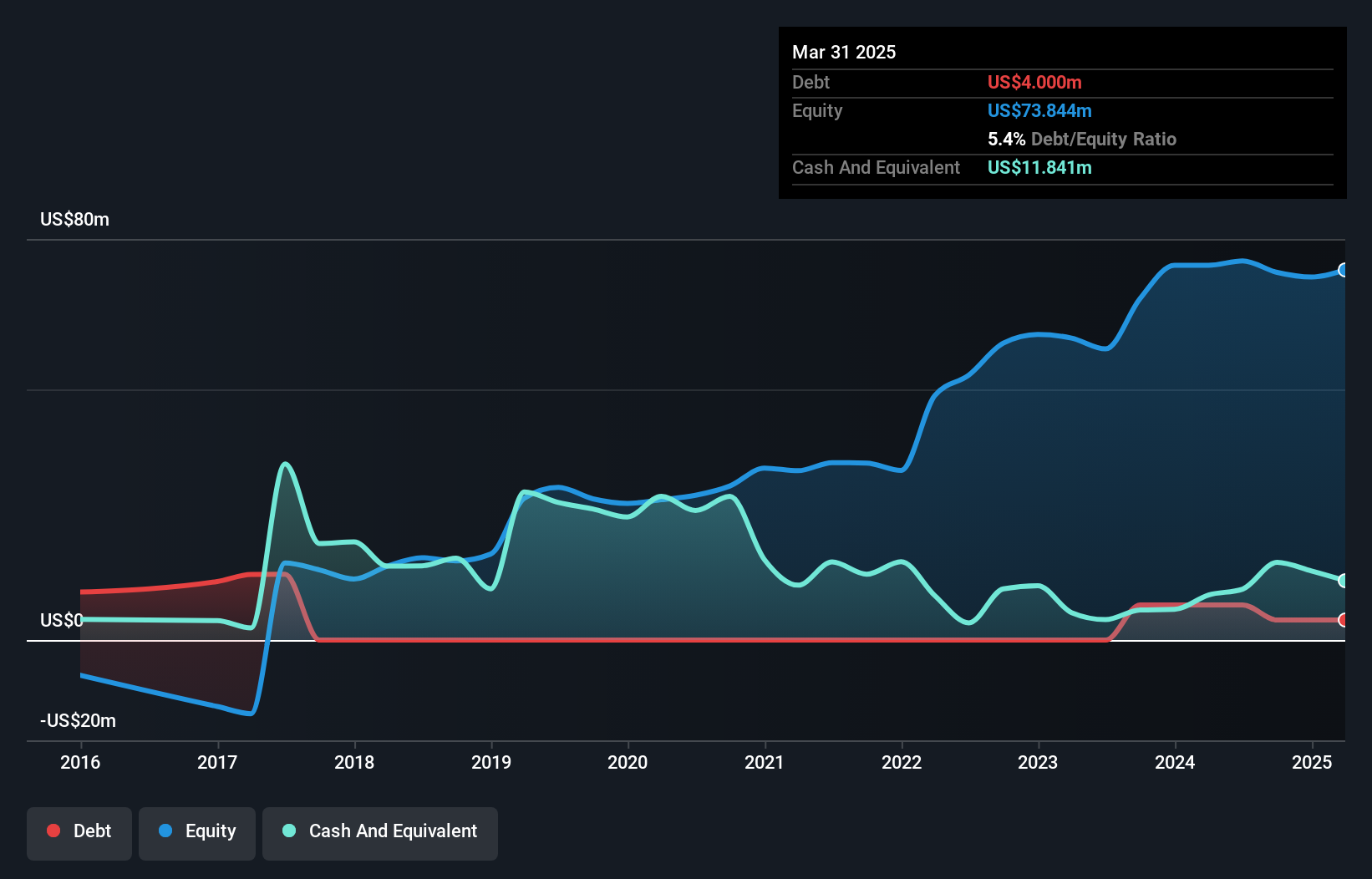Warren Buffett famously said, 'Volatility is far from synonymous with risk.' So it might be obvious that you need to consider debt, when you think about how risky any given stock is, because too much debt can sink a company. We can see that SoundThinking, Inc. (NASDAQ:SSTI) does use debt in its business. But should shareholders be worried about its use of debt?
What Risk Does Debt Bring?
Generally speaking, debt only becomes a real problem when a company can't easily pay it off, either by raising capital or with its own cash flow. In the worst case scenario, a company can go bankrupt if it cannot pay its creditors. However, a more frequent (but still costly) occurrence is where a company must issue shares at bargain-basement prices, permanently diluting shareholders, just to shore up its balance sheet. Of course, debt can be an important tool in businesses, particularly capital heavy businesses. The first thing to do when considering how much debt a business uses is to look at its cash and debt together.
What Is SoundThinking's Net Debt?
As you can see below, SoundThinking had US$4.00m of debt at March 2025, down from US$7.00m a year prior. However, it does have US$11.8m in cash offsetting this, leading to net cash of US$7.84m.

How Healthy Is SoundThinking's Balance Sheet?
According to the last reported balance sheet, SoundThinking had liabilities of US$54.7m due within 12 months, and liabilities of US$7.80m due beyond 12 months. On the other hand, it had cash of US$11.8m and US$29.5m worth of receivables due within a year. So its liabilities total US$21.1m more than the combination of its cash and short-term receivables.
Of course, SoundThinking has a market capitalization of US$139.3m, so these liabilities are probably manageable. However, we do think it is worth keeping an eye on its balance sheet strength, as it may change over time. Despite its noteworthy liabilities, SoundThinking boasts net cash, so it's fair to say it does not have a heavy debt load! When analysing debt levels, the balance sheet is the obvious place to start. But ultimately the future profitability of the business will decide if SoundThinking can strengthen its balance sheet over time. So if you're focused on the future you can check out this free report showing analyst profit forecasts.
View our latest analysis for SoundThinking
In the last year SoundThinking wasn't profitable at an EBIT level, but managed to grow its revenue by 7.7%, to US$105m. That rate of growth is a bit slow for our taste, but it takes all types to make a world.
So How Risky Is SoundThinking?
While SoundThinking lost money on an earnings before interest and tax (EBIT) level, it actually generated positive free cash flow US$12m. So although it is loss-making, it doesn't seem to have too much near-term balance sheet risk, keeping in mind the net cash. With revenue growth uninspiring, we'd really need to see some positive EBIT before mustering much enthusiasm for this business. There's no doubt that we learn most about debt from the balance sheet. However, not all investment risk resides within the balance sheet - far from it. For example - SoundThinking has 1 warning sign we think you should be aware of.
If you're interested in investing in businesses that can grow profits without the burden of debt, then check out this free list of growing businesses that have net cash on the balance sheet.
New: Manage All Your Stock Portfolios in One Place
We've created the ultimate portfolio companion for stock investors, and it's free.
• Connect an unlimited number of Portfolios and see your total in one currency
• Be alerted to new Warning Signs or Risks via email or mobile
• Track the Fair Value of your stocks
Have feedback on this article? Concerned about the content? Get in touch with us directly. Alternatively, email editorial-team (at) simplywallst.com.
This article by Simply Wall St is general in nature. We provide commentary based on historical data and analyst forecasts only using an unbiased methodology and our articles are not intended to be financial advice. It does not constitute a recommendation to buy or sell any stock, and does not take account of your objectives, or your financial situation. We aim to bring you long-term focused analysis driven by fundamental data. Note that our analysis may not factor in the latest price-sensitive company announcements or qualitative material. Simply Wall St has no position in any stocks mentioned.
About NasdaqCM:SSTI
SoundThinking
A public safety technology company, provides data-driven solutions and strategic advisory services for law enforcement, security teams, and civic leadership.
Undervalued with mediocre balance sheet.
Similar Companies
Market Insights
Community Narratives


Recently Updated Narratives

Constellation Energy Dividends and Growth

CoreWeave's Revenue Expected to Rocket 77.88% in 5-Year Forecast

Bisalloy Steel Group will shine with a projected profit margin increase of 12.8%
Popular Narratives


MicroVision will explode future revenue by 380.37% with a vision towards success


NVDA: Expanding AI Demand Will Drive Major Data Center Investments Through 2026



